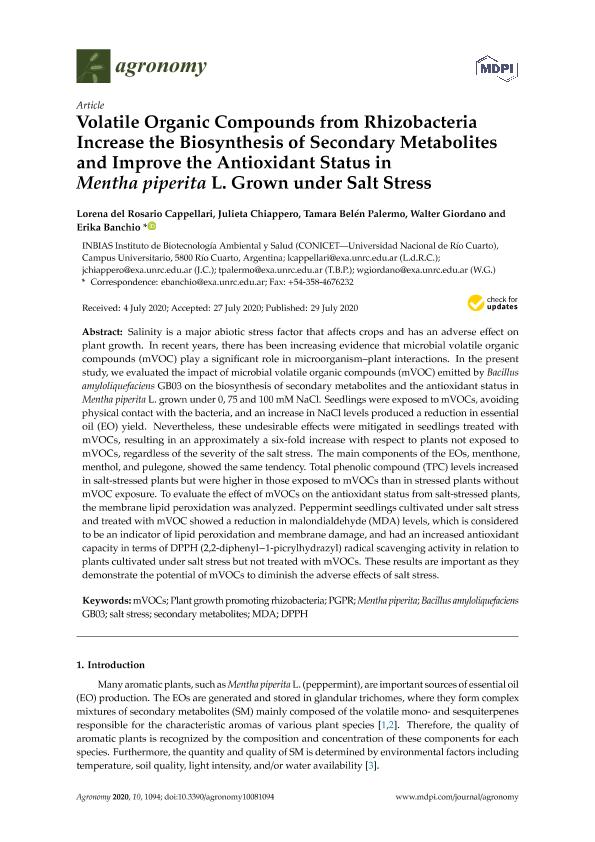Artículo
Volatile organic compounds from rhizobacteria increase the biosynthesis of secondary metabolites and improve the antioxidant status in mentha Piperita L. Grown under salt stress
Cappellari, Lorena del Rosario ; Chiappero, Julieta
; Chiappero, Julieta ; Palermo, Tamara Belen
; Palermo, Tamara Belen ; Giordano, Walter Fabian
; Giordano, Walter Fabian ; Banchio, Erika
; Banchio, Erika
 ; Chiappero, Julieta
; Chiappero, Julieta ; Palermo, Tamara Belen
; Palermo, Tamara Belen ; Giordano, Walter Fabian
; Giordano, Walter Fabian ; Banchio, Erika
; Banchio, Erika
Fecha de publicación:
08/2020
Editorial:
MDPI
Revista:
Agronomy
ISSN:
2073-4395
Idioma:
Inglés
Tipo de recurso:
Artículo publicado
Clasificación temática:
Resumen
Salinity is a major abiotic stress factor that affects crops and has an adverse effect on plant growth. In recent years, there has been increasing evidence that microbial volatile organic compounds (mVOC) play a significant role in microorganism plant interactions. In the present study, we evaluated the impact of microbial volatile organic compounds (mVOC) emitted by Bacillus amyloliquefaciens GB03 on the biosynthesis of secondary metabolites and the antioxidant status in Mentha piperita L. grown under 0, 75 and 100 mM NaCl. Seedlings were exposed to mVOCs, avoiding physical contact with the bacteria, and an increase in NaCl levels produced a reduction in essential oil (EO) yield. Nevertheless, these undesirable effects were mitigated in seedlings treated with mVOCs, resulting in an approximately a six-fold increase with respect to plants not exposed to mVOCs, regardless of the severity of the salt stress. The main components of the EOs, menthone, menthol, and pulegone, showed the same tendency. Total phenolic compound (TPC) levels increased in salt-stressed plants but were higher in those exposed to mVOCs than in stressed plants without mVOC exposure. To evaluate the effect of mVOCs on the antioxidant status from salt-stressed plants, the membrane lipid peroxidation was analyzed. Peppermint seedlings cultivated under salt stress and treated with mVOC showed a reduction in malondialdehyde (MDA) levels, which is considered to be an indicator of lipid peroxidation and membrane damage, and had an increased antioxidant capacity in terms of DPPH (2,2-diphenyl-1-picrylhydrazyl) radical scavenging activity in relation to plants cultivated under salt stress but not treated with mVOCs. These results are important as they demonstrate the potential of mVOCs to diminish the adverse effects of salt stress.
Archivos asociados
Licencia
Identificadores
Colecciones
Articulos (INBIAS)
Articulos de INSTITUTO DE BIOTECNOLOGIA AMBIENTAL Y SALUD
Articulos de INSTITUTO DE BIOTECNOLOGIA AMBIENTAL Y SALUD
Citación
Cappellari, Lorena del Rosario; Chiappero, Julieta; Palermo, Tamara Belen; Giordano, Walter Fabian; Banchio, Erika; Volatile organic compounds from rhizobacteria increase the biosynthesis of secondary metabolites and improve the antioxidant status in mentha Piperita L. Grown under salt stress; MDPI; Agronomy; 10; 8; 8-2020; 1-16
Compartir
Altmétricas



